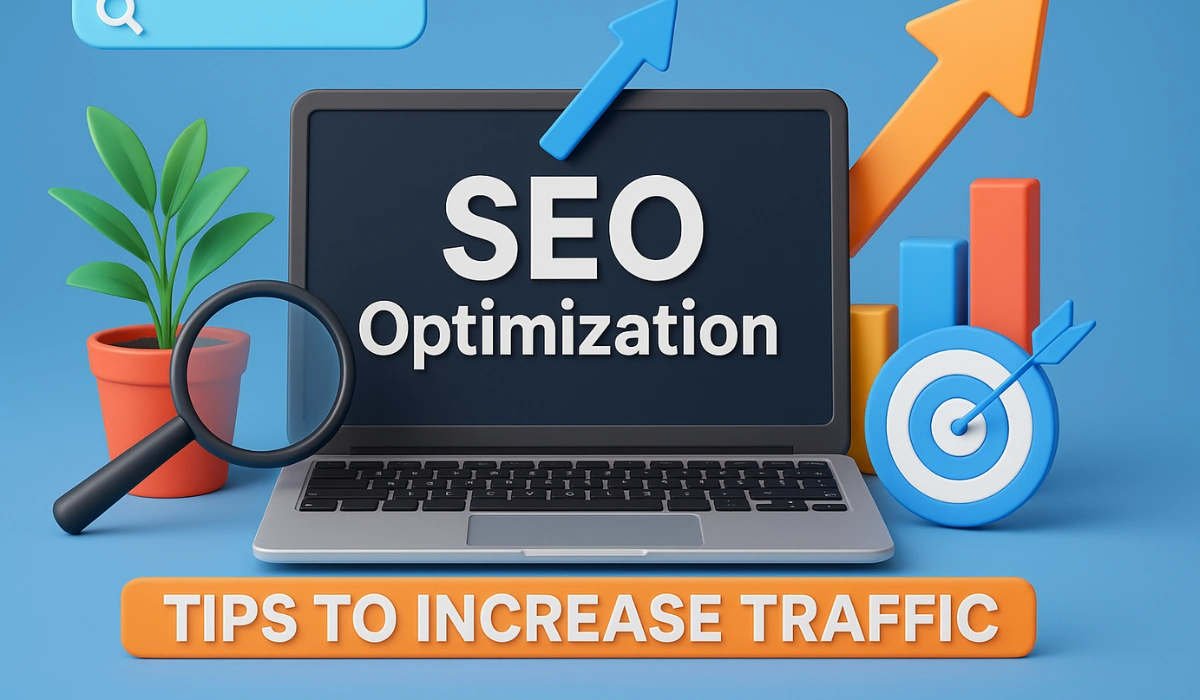Every blogger dreams of seeing their posts rank high on search engines and attracting a steady flow of readers. But in today’s competitive digital landscape, just writing high-quality content isn’t enough. Without the right optimization strategies, even the most insightful articles risk going unnoticed. That’s where SEO optimization for bloggers: tips to increase traffic comes into play. By applying the right techniques, you can improve visibility, attract the right audience, and build a loyal reader base.
Search Engine Optimization (SEO) is the backbone of digital success. For bloggers, SEO isn’t just about ranking higher—it’s about being found by the people who truly value your content. Whether you’re running a personal blog, a niche website, or a business platform, implementing SEO optimization for bloggers: tips to increase traffic can make the difference between a stagnant blog and one that thrives.
One of the biggest challenges bloggers face is competing with established websites. However, with proper keyword research, on-page techniques, and consistent optimization, even new bloggers can carve out their space. The beauty of SEO is that it creates a level playing field where creativity, consistency, and strategy work together to deliver results.
SEO optimization for bloggers: tips to increase traffic that you can start applying today:
1. Master Keyword Research
Keywords form the foundation of SEO. Use tools like Google Keyword Planner, SEMrush, or Ubersuggest to find relevant search terms. Focus on long-tail keywords, as they are less competitive and more specific. For example, instead of targeting “SEO,” aim for “SEO optimization for bloggers: tips to increase traffic.” This makes your content more discoverable to your exact audience.
2. Write High-Quality, Engaging Content
Google rewards content that provides value. Don’t just stuff your posts with keywords—focus on answering your audience’s questions and solving their problems. Incorporate your target keyword naturally in titles, headers, and throughout the blog. A well-structured article with the right keyword placement significantly improves your chances of ranking higher.
3. Optimize On-Page Elements
On-page SEO is essential for visibility. Use your target keyword in:
Title tags and meta descriptions
H1 and H2 headers
Image alt tags
Internal links
When applied strategically, these small changes reinforce your blog’s relevance. For example, inserting SEO optimization for bloggers: tips to increase traffic in the meta description tells both users and search engines what the content is about.
4. Improve Blog Loading Speed
A slow blog discourages readers and harms rankings. Optimize images, enable caching, and consider using a Content Delivery Network (CDN) to reduce loading times. Google considers page speed a key ranking factor, so faster websites not only rank better but also keep visitors engaged.
5. Focus on Mobile Optimization
Most readers today access blogs through their mobile devices. If your site isn’t mobile-friendly, you’re losing out on a huge share of traffic. Responsive design ensures that your blog adapts to different screen sizes, providing a seamless experience for every visitor.
6. Build Backlinks Strategically
Backlinks act as endorsements for your blog. Reach out to other bloggers, contribute guest posts, or collaborate on content. Quality backlinks signal to search engines that your blog is trustworthy and valuable, boosting your authority and ranking potential.
7. Leverage Internal Linking
Internal links guide readers to related content on your blog, keeping them engaged longer. This also helps search engines understand the structure of your site and improves crawlability. Use descriptive anchor text that naturally incorporates your keyword when possible.
8. Consistency is Key
Publishing high-quality posts consistently shows search engines that your blog is active and relevant. Develop a content calendar and stick to it. Over time, consistent posting combined with SEO best practices drives exponential growth.
By implementing these SEO optimization for bloggers: tips to increase traffic, you’re setting the stage for sustainable, long-term success.
The journey of blogging doesn’t end with hitting the “publish” button—it begins there. Start applying these techniques step by step. Begin with keyword research, optimize your current content, and then focus on backlinks and consistency. Remember, SEO is not an overnight solution; it’s a long-term strategy that pays off with persistence.
If you’re serious about growing your blog, now is the time to embrace SEO optimization for bloggers: tips to increase traffic. With the right strategies, your blog can attract more visitors, engage your audience, and establish your authority in your niche.
Take action today—implement these tips, monitor your growth, and watch your blog transform into a traffic-generating powerhouse.
Frequently Asked Questions
1. What is SEO optimization for bloggers?
It’s the process of applying SEO techniques specifically to blogs to improve rankings, visibility, and traffic.
2. How can keyword research increase blog traffic?
Keyword research helps identify what your audience is searching for, allowing you to create content that matches their needs.
3. Why are long-tail keywords important for bloggers?
Long-tail keywords have less competition and attract readers who are closer to taking action.
4. How often should I publish blog posts for better SEO?
Consistency is key. Posting at least once a week helps build authority and keeps your site active.
5. Can backlinks really improve my blog rankings?
Yes, quality backlinks signal trust and authority to search engines, which can significantly boost rankings.
6. Is mobile optimization necessary for blog SEO?
Absolutely. With most users browsing via mobile, a responsive design ensures better user experience and higher rankings.
7. How does page speed affect blog SEO?
Faster blogs rank better because Google prioritizes sites that load quickly and offer smoother user experiences.
8. What’s the most important step in SEO optimization for bloggers?
While all steps matter, mastering keyword research and producing high-quality content are the foundations of long-term success.




